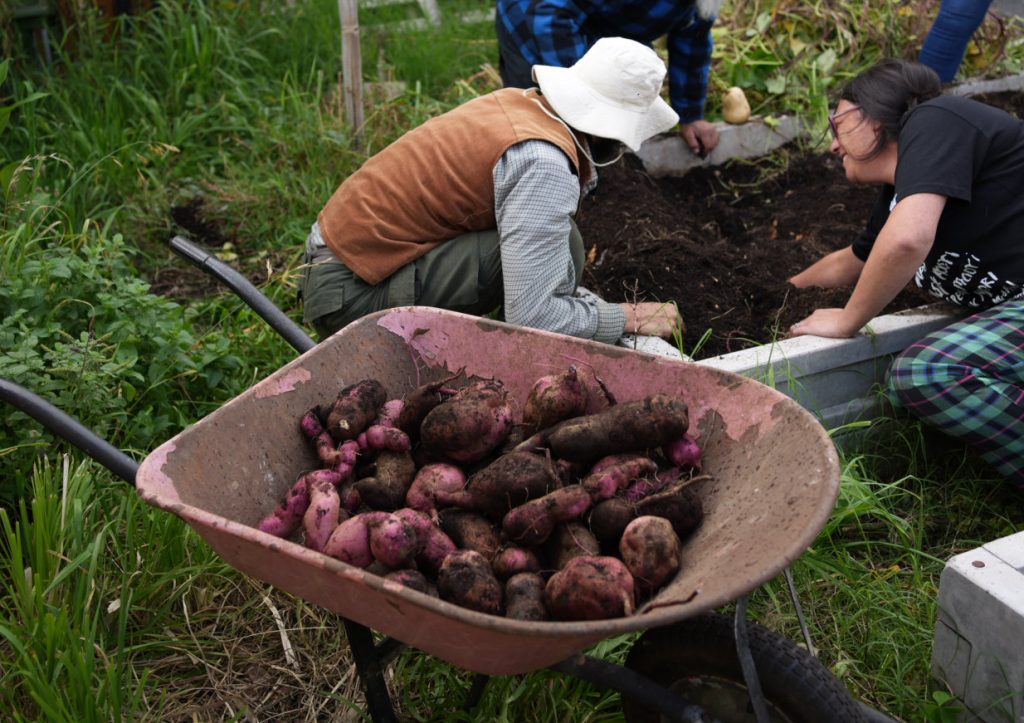Kai education
Go Eco acknowledges the history of the Waikato as a food-growing region, and is committed to working toward a food-sovereign Waikato in alignment with aspirations of iwi, hapū and whānau. We support the definition of food security from the 1996 World Food Summit:
“Food security exists when all people at all times have physical and economic access to sufficient, safe, and nutritious food that meets their dietary needs and food preferences for an active and healthy life”
We also recognise that being able to acquire socially and culturally acceptable foods in socially and culturally acceptable ways is an important part of food security.
Go Eco connects people and groups to knowledge and resources to grow food in an urban space, improve soil health, conserve water, care for fruit trees, maintain compost and worm farm set ups and support local food resilience. We run free or low cost seasonal gardening workshops through the year – for updates follow our Eventbrite.
Planting seeds and watching communities grow
Go Eco has played a key role in supporting local food-growing initiatives across Waikato by connecting people and groups to the knowledge and resources they needed to grow food in urban spaces. Through free workshops, we provided practical skills in improving soil health, conserving water, caring for fruit trees, maintaining compost and worm farms, and strengthening local food resilience. Our seed-saving and sharing initiatives empowered communities to grow food sustainably, while our long-standing support for monthly crop swaps contributed to their growth—eventually happening weekly across the city. We also worked alongside community gardens, to help these spaces thrive as hubs for connection, learning, and local food production.
Our Carpark Garden
In May 2020, we began transforming a section of our Commerce Street carpark into a thriving garden, repurposing space once used for cars into a place of growth, learning, and connection with nature. We started with containers filled with compost and soil, using recycled pallet wood to build raised beds, benches, and tables. Worm farms managed our office food scraps, while IBC crates collected rainwater, reducing water use during hot summers. Our first crops included Lettuce, Kumara, Beans, Tomatoes, Pumpkins, Yacon, Yams, and water chestnuts, which continue to produce reliable harvests.
Challenges taught us valuable lessons. The heat from the asphalt required daily watering, so we spread wood chips to reduce evaporation. As the mulch decayed, plants like kumara began to self-seed. Raised beds with banana plants and mountain pawpaw soon provided essential shade, transforming the space further. In 2021, we noticed stunted growth in crops like Tomatoes and Beans, traced to herbicide-contaminated compost. This experience reinforced the importance of observing plant health and sourcing carefully.
Our efforts were rewarded this year when we harvested our first bananas—small, sweet, and rare in the Waikato—and an impressive 25kg of kumara. Digging through the garden was a joyful, hands-on experience for the team.
The garden evolved into a flourishing ecosystem with improved shade, water retention, and increased insect and bird life. It was also a space for seasonal workshops on worm farming, water conservation, and seed planting, giving participants hands-on learning opportunities.
Upon taking on a new lease in Devon Road, we began the slow deconstruction of the garden, rehoming soil, plants and planters to other community centres and gardens – whilst sad for the team, we are now working on what we can grow in an even smaller space at our new site.
